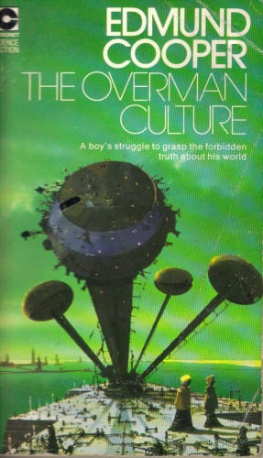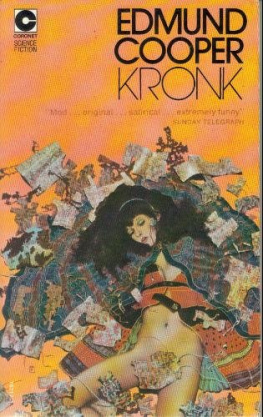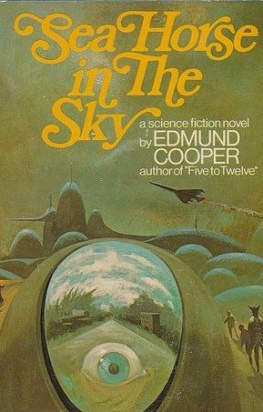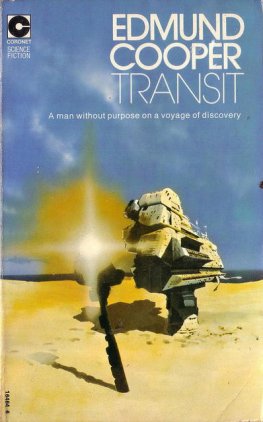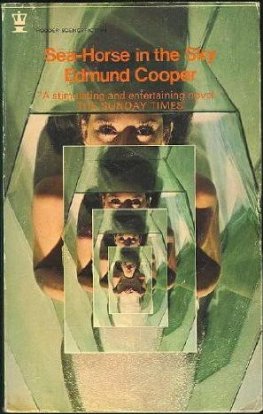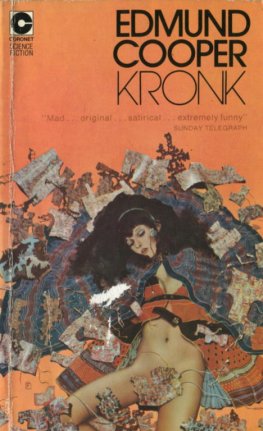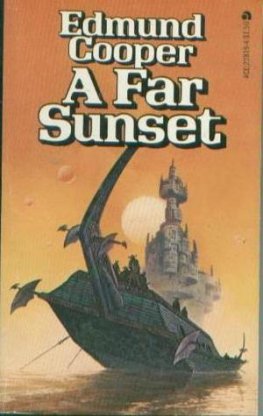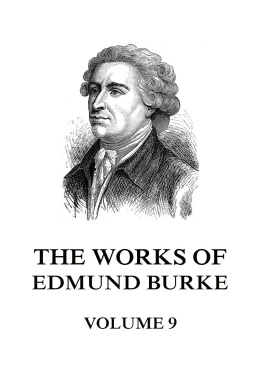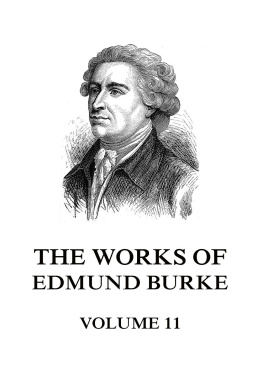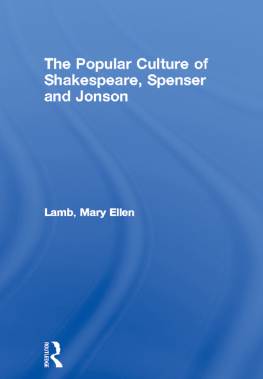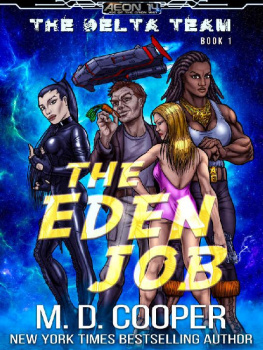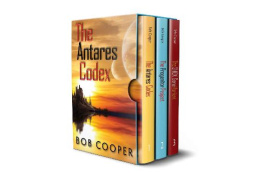Edmund Cooper
The Overman Culture
Time present and time past
Are both perhaps present in time future,
And time future contained in time past.
T.S. ELIOT
Prologue
Mr. and Mrs. Faraday had a nice little house in Buckingham Palace Road, London. They had a nice little rose garden and a nice little pond which contained goldfish. They had color television and wireless; and they watched the American expedition touch down on Mars, and they listened to Mr. Henry Hall's dance band music. Their house had a nice bay window, where two potted aspidistras flourished, and through which Mr. and Mrs. Faraday sometimes glimpsed Queen Victoria riding in her hovercar or Sir Winston Churchill strolling to the Palace.
They had nice furniture, a tape recorder, a box camera, an electronic cooker and two splendid bicycles. They sometimes went to the pictures on Saturday evening, and they listened to the war news every day.
And they had a little boy called Michael. This is his story. This is how he grew up and eventually discovered the truth.
But when he saw the bodies, chilled beyond death, beyond life, as they had existed throughout the limbo of millennia; and when he heard the voice say THIS IS MANKIND, he found the truth almost too terrible to bear
Part One
Michael had a good memory. He remembered things significant and insignificant. He remembered-if hazily-when he was young enough to be fed milk only. He remembered the odd child who disappeared from play school, and he remembered the other child who fell (or was pushed?) from the high window and lay all smashed and crumpled on the ground, but not bleeding. And he remembered how he had wanted to know about words, how you could keep them, how you could fix them-perhaps like a drawing-forever.
He remembered nightmares and fantasies and a growing sense of oddness. He remembered when he first began to hope that people would hurt themselves a little so that he could see if they would bleed. He remembered the questions that did not seem to be properly answered. He remembered that Mother and Father had never ever raised their voices. He remembered his first walk by the river Thames, his first visit to the cinema, his first knowledge of air raids. He remembered when desire first stirred in his flesh, and when he began to love Emily Bronte.
Sometimes he thought he was mad. Sometimes he thought he was sane. Then he began to think he could be both sane and mad.
It had always been Mother who gave him milk from the bottle. He was sure of that. Always Mother. Always the same kind of smile. Sometimes, particularly when he was tired, drifting in the twilight between waking and sleeping, he could see her face now as it must have seemed then-vast, calm, pleasant, filling half the world.
Mother had always been calm, Mother always was calm, Mother always would be calm. And, for reasons that he could not understand, that, too, seemed terrible.
Father was different. Father was a bit abrupt-stern, even. He always had been, always would be.
Sometimes, Mother and Father laughed. Chiefly, they seemed to laugh when Michael asked silly questions. Michael did not know why the questions were silly. But Father said they were; and so, for a time, he thought they must be.
Later, there were the bigger questions, leading in the end to the biggest question of all.
Where does childhood end and maturity begin? Where do dreams border with reality? Where does truth separate from fantasy? These were problems that haunted Michael. They had been haunting him for a long time, long before he had the words to describe them clearly. Before the bricks were abandoned in the nursery, before he rejected the talking teddy bear because somehow he knew it was a traitor.
Early memories, early dreams. Early delights, early nightmares. The Thames was beautiful and blue, and on a spring morning a small boy could sit on the Embankment wall, staring down through the clear water at shoals of trout playing hide and seek among boulders and waterweed. The sun was warm and the sky hazy; and even with the sounds of war bumping and crumping and thudding away on the other side of the force field.
London was sweetly silent. The Sunday silence was best of all. Somehow it seemed to throb.
"What is a force field, Father?"
"That's a big question for a little boy See, the swans are chasing the trout. Do you think they will catch any?"
"The swans aren't chasing the trout, Father. The swans are just floating. The trout don't like moving shadows What is a force field?"
"Michael, there are some things you can't properly understand. A force field is something you can't see, but it is like a big umbrella, a safety umbrella. We live under it, and even if the laser batteries can't destroy the enemy missiles, they still won't get through the force field. Shall we walk home, now? I think it might rain."
"Yes, Father."
Father was very good at predicting the weather. Amazingly good.
Mother had an electric sewing machine. She liked to make things, and she made almost all of Michael's clothes; but the strange thing was that she seemed to prefer to do most of the sewing by hand. She liked embroidery, and she liked to sit in the evening listening to the wireless-the Palm Court orchestra, or the Beatles, or Nelson Eddy and Jeanette MacDonald-with her needle in her hand.
There was one particular piece of embroidery that Michael remembered. It was to be a new bed quilt for him, covered with lots of small silky animals. It took a long time to complete. For several nights Michael watched his mother working on the shape of an elephant. Each night she seemed to be having to embroider again a part that she had done on a previous night.
Michael was curious. He wondered if she could not see too well by lamplight. He wondered if, in daylight, she would examine her work, be dissatisfied with it and unpick the stitches.
At last, he asked her about it. But she only laughed. "What a quaint little boy you are, Michael. I don't think you can have been watching me very carefully. Of course, I don't unpick the stitches when you are at play school. That would be silly."
But thereafter, the bed quilt progressed at a faster rate.
Mother had golden hair, Father had light-brown hair, Michael had black hair. One day he asked his parents why this should be so.
Father answered. "It just happens that way, Michael. That is the way it is. Hair comes in different colors like noses come in different shapes and lengths. No two things or people are ever exactly the same. Remember that. It is important And Michael. You ask a lot of questions. It shows you are clever. But people can be too clever, and then they get unhappy. Happiness is a great thing, Michael. Happiness and contentment. That is what we want you to have. We want you to lead a happy life. So, don't worry your head with too many questions. It is much more important to enjoy yourself. Now run outside and play for a while, then you will be really tired, and you will sleep well and not have any more of those silly nightmares."
But Michael remembered that the child at play school who fell from the high window and lay all smashed without bleeding had yellow hair. And he remembered that the little girl who fell on her knees in the playground and cried when the blood came had black hair.
And he knew that he liked her very much. And he wondered if it was because she could bleed.
Michael could bleed. Secretly, he would occasionally cut himself a little to make sure he could still bleed. Vaguely, he was afraid that one day he might change. He was afraid that one day he might find no blood left inside him.

